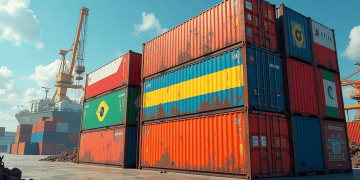The Philippines is exploring new market opportunities in South America and the Middle East following recent tariff increases imposed by the United States, the Department of Trade and Industry (DTI) announced on Wednesday.
The US has implemented a 17% tariff on goods from the Philippines as part of its reciprocal tariff scheme under former President Donald Trump’s policies. DTI Secretary Cristina Roque highlighted that the government is looking into expanding exports to various regions, including South America, the Middle East, and other parts of Asia, particularly for products in high demand like semiconductors and agricultural items, such as coconuts.
While pursuing new markets, the Philippines remains hopeful of negotiating with the US to reduce tariffs or pursue a potential Free Trade Agreement. Secretary Roque emphasized the benefits that could arise from such an agreement, stating, “We’re still optimistic and are looking at opportunities for free trade with several countries.”
Although the Philippines is seeking to diversify its trade partners, the 17% tariff under the new scheme is lower compared to neighboring countries like Cambodia (49%), Vietnam (46%), and Thailand (34%). This lower tariff provides an opportunity for the Philippines to compete in global markets, especially in sectors like coconut and dried mango exports, which have faced competition from Thailand and Cambodia.
Joey Concepcion, founder of Go Negosyo, stated that the new US tariffs are unlikely to have a significant impact on micro, small, and medium enterprises (MSMEs) exporting Filipino products, which mainly include niche items like instant noodles and flavored sauces. He suggested that these products are not yet mainstream in the US, making them less likely to be affected by the tariff increases.
The Philippines continues to be one of the fastest-growing economies in Southeast Asia, with the United States remaining its largest export market. In 2024, exports to the US totaled $12.12 billion, accounting for 16.6% of the country’s total exports.
Meanwhile, ASEAN finance ministers are scheduled to meet on April 10 to discuss the collective response to the US tariff situation, with discussions expected to focus on regional strategies to address the issue.
Stay informed with supply chain news on The Supply Chain Report. Learn more about international trade at ADAMftd.com.
#PhilippinesTrade #NewMarkets #SouthAmericaTrade #MiddleEastTrade #USTariffs #GlobalExpansion #InternationalTrade















